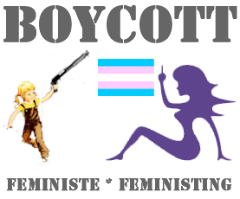For once I'm going to kind of agree with those whacky transphobic feminists who claim they are radical feminists when they claim that feminism isn't about gender and that feminism is about sex. Okay, I'm not really going to agree with them, but I hope that got your attention. The point I am going to pick up on is the conflict that feminism seems to have with gender, which the transphobes do suggest.
Before I go further, it's perhaps helpful to give a quick idea of what I mean by "gender". Here I mean it as that which exists in the social sphere and is usually regarded as arising from physical sex and reveals itself in varying ways in the personal and social. Gender, as it relates to feminism, is the means by which women are defined as less than men in society, the means by which sexism operates. Feminism has pointed out how gender is a social construct and done lots of analysis to investigate the many ways in which gender operates upon men and women as well as working to try to deal with ending sexism. Gender has proved very fruitful for feminism.
The problem arises for feminism in that many, if not most, cis feminists seem to have decided that because they have learned so much about the way in which gender affects (cis) women and (cis) men that this means that feminism is the only, or at least the best, place that gender can be dealt with. This has resulted in cis feminists deciding that they know best how trans people should deal with the role of gender in our lives and prescribing and proscribing what we should do. It has almost always meant that they blame trans people for enforcing and upholding societal standards of gender while showing no awareness of their complicity in those standards (Hint: If you're telling trans people how to deal with gender, you're almost inevitably enforcing gender standards.), and, most egregiously, their drafting of trans people for the "end of gender"/gender revolution/whatever (On this last point, I would at the least suggest that revolutionaries who are drafted are not going to be committed to the revolution; just saying.). That is to say, feminism seems to flounder in gender when it tries to expound upon an understanding of gender beyond that based in cis men and cis women.
So, long post short, we see that cis feminists haven shown a limited understanding of gender. I'm almost willing to grant them expertise on gender and cis wo/men except they have often shown a lack of understanding that gender does not affect even all cis women the same way and have a nasty habit of totalitising their gender analysis based upon a certain type of cis white women in the developed world (ie, they're universalising their own experiences). Now I'm not going to suggest that trans people have any sort of lock on gender (That would be making the same mistake that cis feminists made.) but we certainly do have a variety of gender understandings that is not found among cis feminists. If cis feminists bother to listen they might learn something and might even gain new insights into the way in which gender works among cis people.
It’s your fault if your son becomes a womaniser!
15 years ago





